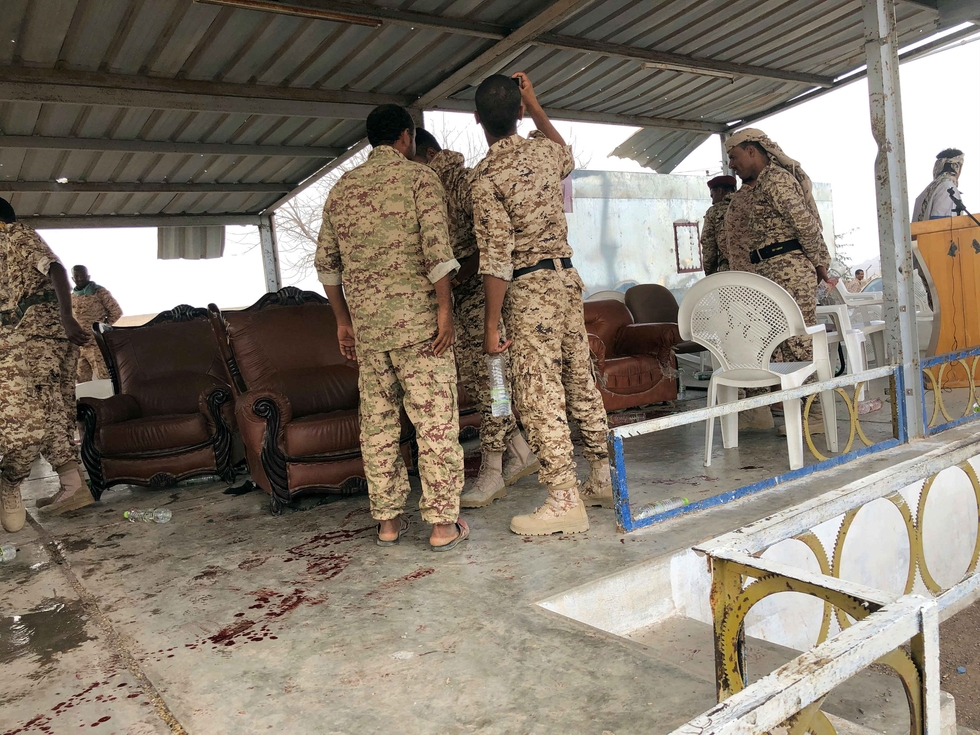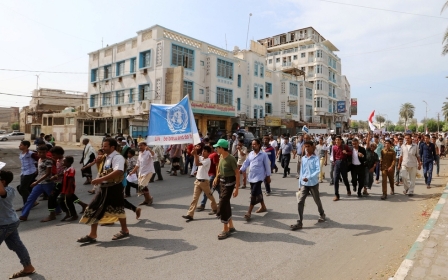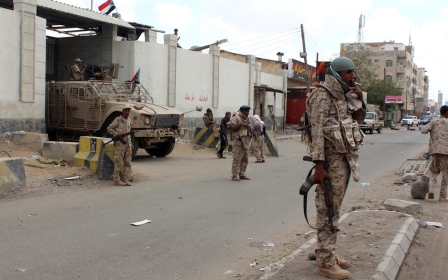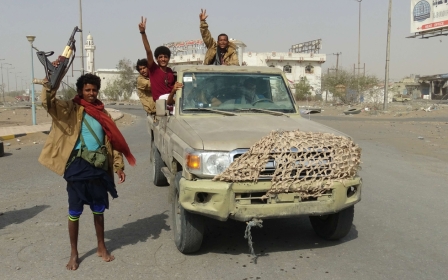Several killed in Houthi drone strike on Yemen's largest air base

Houthi rebels have used drones to attack a Yemen pro-government military parade at the Al-Anad air base in Lahaj province, killing at least six people.
The parade was taking place on Thursday when a loud explosion rocked the area, witnesses said, adding that high-ranked officials, including Yemen's deputy chief of staff, were wounded in the attack.
A source in the health office in Aden told Middle East Eye that six people were killed and more than 25 injured, "including military leaders and a leader in the presidential forces".
He added that the figures may increase in the coming hours as new casualties were still arriving to Aden city among an intense security presence.
The Houthi's Al-Masirah TV said the attack had targeted "the leadership of the invaders".
Loyalist chief of staff General Abdullah al-Nakhi, his deputy, Saleh al-Zandani, and Lahij governor Ahmad Abdullah al-Turki were all at the base at the time of the attack, a pro-government source said.
A military source said the attack targeted the podium where officials were sitting.
It was unclear if military officials were present from Saudi Arabia and the United Arab Emirates, the two Gulf states leading a coalition that intervened in Yemen in 2015 to restore President Abd Rabbuh Mansour Hadi.
Martin Griffiths, the UN special envoy for Yemen, said he was "alarmed" by the attacks and urged all the parties involved to adhere to the "Yemeni peace process".
"The SE calls on the parties to the conflict to create a conducive environment to maintain the positive momentum generated by the Sweden Consultations and the resumption of the Yemeni peace process," the envoy said on Twitter.
Hodeidah dispute
Al-Anad, which lies some 60km north of Yemen's second city Aden, was the headquarters for US troops overseeing a longrunning drone war against al-Qaeda until March 2014, when it was overrun by the Houthis.
It was recaptured by government forces in August 2015 as they recovered territory from the rebels across the south with support from the Saudi-led military coalition.
The Houthis said in November they were halting drone and missile attacks on Saudi Arabia, the United Arab Emirates and their Yemeni allies, but tensions have risen recently over how to implement a UN-sponsored peace deal.
The Houthis and the Saudi-backed government agreed to a ceasefire in the strategic port city of Hodeidah and to withdraw forces at peace talks in Sweden in December.
The agreement followed months of diplomacy and Western pressure to end the nearly four-year-old war that has killed tens of thousands of people.
But its implementation has stalled as the agreement did not spell out who would control Hodeidah city after the troop withdrawal.
Mohammed Ali, a Yemeni journalist based in Taiz, told MEE that the attack could undermine the peace deal.
"The Houthis do not want a peaceful solution and the attack on al-Anad airbase is a clear indication of that,” he said.
'While Yemenis are looking forward to peace, the Houthis insist on killing Yemenis'
- Mohammed Ali, journalist
“While Yemenis are looking forward to peace, the Houthis insist on killing Yemenis.”
He added that the attack on al-Anad airbase sent a message that the Houthis could target important pro-Hadi institutions in the south.
“The Houthis have smuggled modern weapons from Iran and they are using them to kill Yemenis around the country," he said
However, the pro-Houthi political analyst Mohammed al-Dailami pointed out that he war has not stopped yet and argued that Houthis had not violated any ceasefire by targeting Al-Anad
airbase.
“The ceasefire is only in Hodeidah and battles are still ongoing in other provinces - Ansar Allah [the Houthis] targeted the mercenaries in Lahj and
they did not target anyone in Hodeidah,” he told MEE.
He confirmed that the Houthis could target areas deep in the south of Yemen or even in the Gulf countries and they were willing to escalate.
“But that does not mean Ansar Allah do not want the peaceful solution,” he added.
Middle East Eye propose une couverture et une analyse indépendantes et incomparables du Moyen-Orient, de l’Afrique du Nord et d’autres régions du monde. Pour en savoir plus sur la reprise de ce contenu et les frais qui s’appliquent, veuillez remplir ce formulaire [en anglais]. Pour en savoir plus sur MEE, cliquez ici [en anglais].




